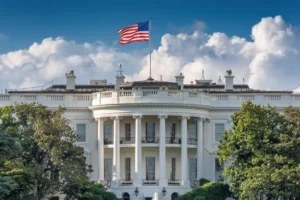A state commission has recommended rejecting the application by Hoonah, a city in Southeast Alaska, to establish its borough.
On Tuesday, the Local Boundary Commission staff released a 36-page preliminary report highlighting “substantive concerns” with the Hoonah borough petition. The report stated that the proposed borough would not provide local government to “a significant population” and would fail to be “a true regional government” by excluding several nearby communities.
The Local Boundary Commission, created by the Alaska Constitution to review changes to municipal government boundaries, consists of five members appointed by the governor. They have the authority to approve, deny, or amend Hoonah’s borough petition to create a borough.
Hoonah, with a population of about 900, has been attempting to establish a borough for over 30 years. The proposed Xunaa Borough—pronounced like Hoonah but with a Tlingit-inspired spelling—would cover over 10,000 square miles, including areas in and around Glacier Bay National Park.
If approved, Xunaa Borough would become Alaska’s 20th borough, ranking eighth in size but third smallest by population. Nearby communities, including Tenakee Springs, Pelican, and Gustavus, were invited to join the borough petition but either declined or have not responded.
Representatives from these communities have expressed concerns, stating they could lose significant federal revenue if the new borough is formed. Tenakee Springs Mayor Linnea Lospenosochatel noted that the Xunaa Borough would encompass the area around the city, potentially reducing residents’ influence over land and watershed management.
Hoonah’s petition specifies that the new borough would not impose property taxes. Instead, the local government would primarily be funded by seasonal sales tax revenue from visitors to Icy Strait Point, a large cruise ship dock and activity destination outside Hoonah.
Supporters argue that establishing the Xunaa Borough would give residents greater control over the region’s future. They anticipate additional state funding for public schools and note that the borough would include the historic territory of the Huna Tlingit, a matter of critical importance to the local tribe.
However, the commission’s report emphasizes a different perspective: “As one commenter succinctly noted, borough formation is not about recognizing indigenous historic territory. Instead, borough incorporation is a modern governance construct designed to unify communities of common interest and deliver services on a regional basis.”
Hoonah, Alaska’s largest Tlingit village, would serve as the hub and government seat of the proposed borough. However, new services for residents outside the city would be limited.
Critics, including residents of small outlying communities like Elfin Cove, argue that they would pay sales taxes without receiving any benefits from the new borough.
The preliminary report on the Hoonah borough petition states, “It essentially swaps one local government for another. Additionally, the borough government would take on very few responsibilities for services currently provided by the state, thereby reducing the state’s benefits from the borough’s formation.”
Following another round of public comments, the commission staff will issue a final report on Hoonah’s petition in September. The five commissioners will hold a public hearing in Hoonah in September and render a final decision on the petition in October.
Dennis Gray Jr., the city administrator of Hoonah, has long advocated for establishing a new borough in Glacier Bay. On Tuesday, Grey said that local officials were reviewing the preliminary report. He emphasized that the objective now is to persuade the five commissioners why the Xunaa Borough should be created.
“We simply don’t agree with them,” Gray commented regarding the preliminary report. “We believe their conclusions are incorrect.”
In 1992, the Local Boundary Commission released a report outlining potential “model” boroughs for incorporating unorganized areas of the state. One of these proposals was “Glacier Bay Borough,” encompassing Tenakee Springs, Pelican, and Gustavus.
However, the staff of the Local Boundary Commission did not advise the commissioners to amend the proposed Xunaa Borough to include these communities. They noted that such a recommendation would only be appropriate if there were widespread community support, which the current petition lacks.
Any newly approved borough by the commission would require majority approval from voters within its boundaries. The most recent borough to be incorporated in Alaska was the Petersburg Borough in 2013.












